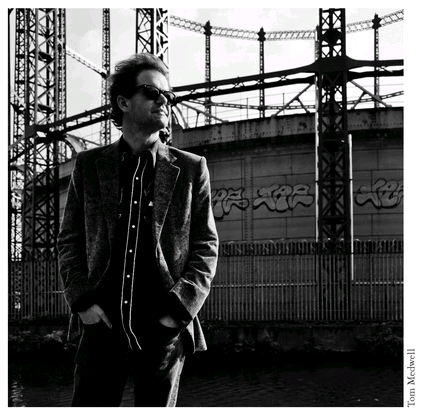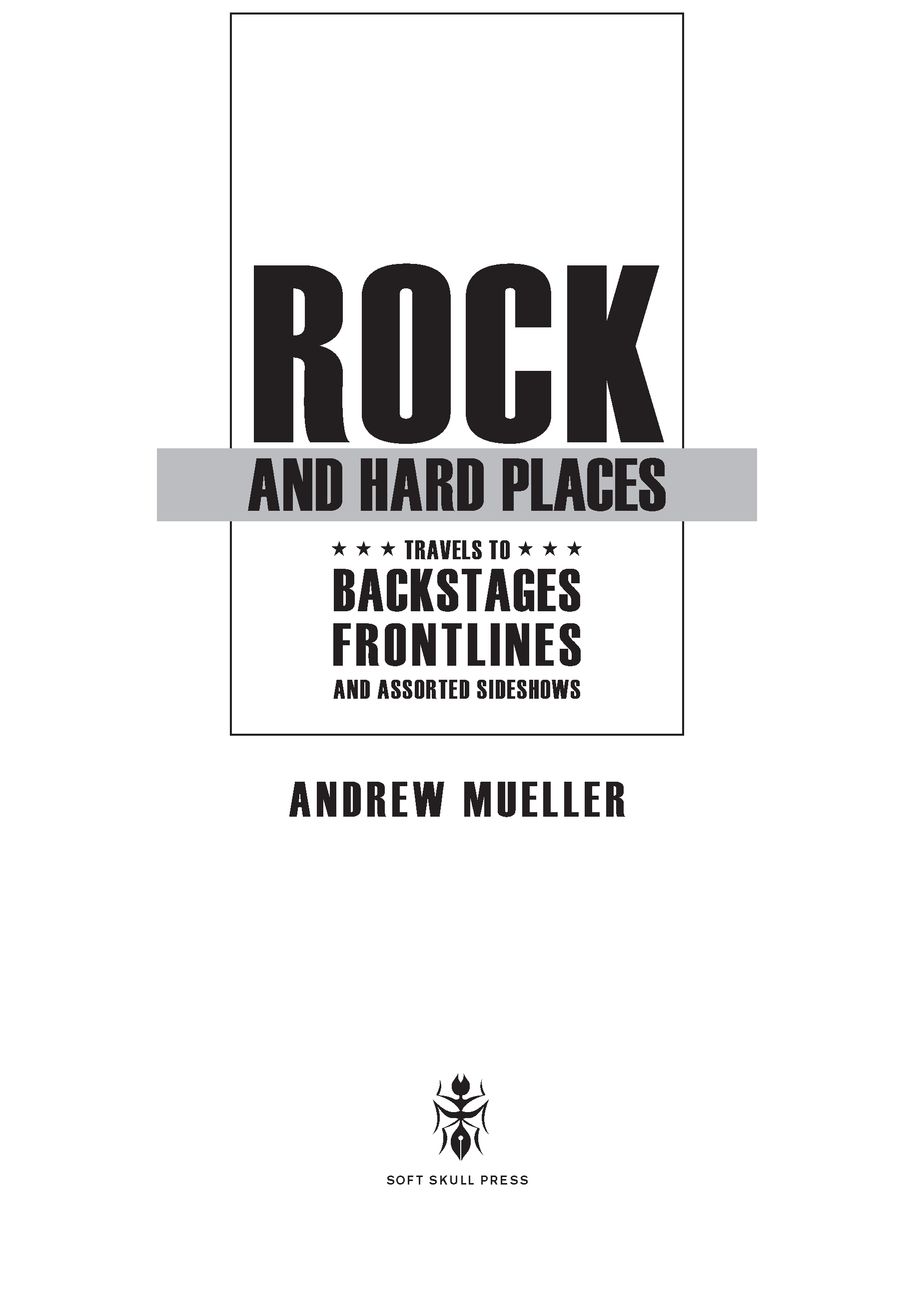Rock and Hard Places
Read Rock and Hard Places Online
Authors: Andrew Mueller


Table of Contents

ANDREW MUELLER
was born in Wagga Wagga, Australia, and lives in London, England. He writes about various things for various titles, including
The Financial Times
,
Monocle
,
The Guardian
,
The Times
,
Esquire
,
Uncut
,
Australian Gourmet Traveller
,
New Humanist
and, frankly, anyone else who’ll have him. Another book of his,
I Wouldn’t Start From Here: The 21st Century and Where It All Went Wrong
, was lauded as “not bad for a guy from Wagga Wagga,” by
The Wagga Wagga Advertiser
.
was born in Wagga Wagga, Australia, and lives in London, England. He writes about various things for various titles, including
The Financial Times
,
Monocle
,
The Guardian
,
The Times
,
Esquire
,
Uncut
,
Australian Gourmet Traveller
,
New Humanist
and, frankly, anyone else who’ll have him. Another book of his,
I Wouldn’t Start From Here: The 21st Century and Where It All Went Wrong
, was lauded as “not bad for a guy from Wagga Wagga,” by
The Wagga Wagga Advertiser
.
Andrew Mueller is also the singer, songwriter and rhythm guitarist with The Blazing Zoos, an incipient alt-country phenomenon who released their debut album,
I’ll Leave Quietly
, in 2010. Mueller plans to spend the royalties generated by its success on an immense and triumphantly gauche Nashville mansion with rhinestone-studded gates and a guitar-shaped swimming pool. Or, a sandwich.
I’ll Leave Quietly
, in 2010. Mueller plans to spend the royalties generated by its success on an immense and triumphantly gauche Nashville mansion with rhinestone-studded gates and a guitar-shaped swimming pool. Or, a sandwich.
His hobbies include swearing at televised sporting fixtures, sighing at newspapers and the maintenance of a minutely annotated list of people who’ll be sorry when he’s famous. Form an orderly queue, ladies.
ADVANCE PRAISE FOR
ROCK AND HARD PLACES
“Andrew Mueller’s piece on my band’s tour with The Hold Steady is my favorite thing ever written about us . . . The fact that he is a war correspondent (although he claims otherwise) and music journalist and approaches both with a similar slant makes him one of the most interesting writers out there to me. The fact that he also is such a great storyteller and does so with such an acute (albeit black) sense of humor makes him that rare beast whose byline I seek out every month.”
—Patterson Hood from Drive-By Truckers
“Andrew Mueller knows the best stories usually linger at the edges of the main event. No matter if it is a rock show or a war, Mueller finds the longest way there . . . This is just good storytelling. He conveys a sense of world-weary cynicism and sublime humor in the same paragraph and I imagine he has distaste for happy endings, even though he seems to keep living them, over and over.”
—Bill Carter, author of
Fools Rush In
and
Red Summer
Fools Rush In
and
Red Summer
MORE PRAISE FOR
ANDREW MUELLER AND HIS RECENT BOOK
I WOULDN’T START FROM HERE
ANDREW MUELLER AND HIS RECENT BOOK
I WOULDN’T START FROM HERE
—P.J. O’Rourke
“His face has the same expression every time: comic disbelief. He can’t believe it’s happened to him again . . . he thinks it’s the poor directions, the road maps or the unkind stranger that pointed him here. And where is here? Nowhere . . . it’s not who he likes to be lost, it’s just that he likes the company of the lost. Be very careful reading this book.”
—Bono
“That perfect blend of investigation, humor, drama, and above all, insight into the global human condition.”
—Robert Young Pelton,
author of
The World’s Most Dangerous Places
author of
The World’s Most Dangerous Places
“A tour-de-force of hilarious, harrowing and ultimately enlightening reportage.”
—
The Washington Times
The Washington Times
“His sardonic, self-deprecating perspective makes for unstuffy company.”
—
The Los Angeles Times
The Los Angeles Times
“A joy.”
—
Financial Times
Financial Times
“A gung-ho Candide with a taste for places it is wiser to avoid . . . graphic, comic, bemused and properly contemptuous of faith and ideology.”
—
Evening Standard
, Books of the Year
Evening Standard
, Books of the Year
“An utterly
sui generis
report from the world’s plague-spots.”
sui generis
report from the world’s plague-spots.”
—
New Statesman
, Books of the Year
New Statesman
, Books of the Year
“A mix of dark humor and incisive political discourse.”
—
CNNGo
CNNGo
“Peppered with trenchant observations that reflect a nimble, cut-to-the-chase practicality, Mueller’s interviews with everyone from terrorist warlords to international peacemakers are refreshingly irreverent yet astute.”
—
Booklist
Booklist
“Travel writing in the danger zone that maintains its hipness and humanity.”
—
Readings Monthly,
Books of the Year
Readings Monthly,
Books of the Year
“I can think of no more entertaining companion on a perilous journey than the ever hopeful, wildly optimistic yet clear-thinking Andrew Mueller.”
—
The Guardian
The Guardian
“Lively reporting from a gently humorous narrator.”
—
The Times
(U.K.)
The Times
(U.K.)
“Touching, often blackly comic reportage.”
—
GQ
GQ
“In the grand tradition of Mark Twain, though in a world considerably more hostile.”
—
The Daily Truth
The Daily Truth
“Brilliantly observed, articulate, often funny and immensely readable.”
—
The List
The List
“An instructive ricochet between cities and continents and war zones.”
—
Time Out
Time Out
“Mueller’s humour saves this book from being just another danger travel memoir.”
—“The Book Show,”
ABC Radio National
ABC Radio National
“Not bad for a guy from Wagga Wagga.”
—
The Wagga Wagga Advertiser
The Wagga Wagga Advertiser

For Mum and Dad

“Many shall run to and fro, and knowledge shall be increased.”
—DANIEL 12:4

“Road (n): A strip of land along which one may pass from where it is too tiresome to be to where it is futile to go.”
—AMBROSE BIERCE,
The Devil’s Dictionary
The Devil’s Dictionary
THE GREAT LEAP FOREWORD
Introduction
ZAGREB, CROATIA, AUGUST 2009
I
T IS A fitting happenstance of deadline that I’m writing this here and now—in Zagreb, Croatia, in between U2’s two shows at Maksimir Stadium. As the thrillingly witty pun that serves as this book’s title suggests, the reportage gathered in this volume straddles, with varying degrees of chafing, the realms of rock’n’roll and conflict, and it’s a version of that same ungainly feat that U2 are attempting here. The two nights U2 are playing in Zagreb are their first shows ever in Croatia, and their first anywhere in the former Yugoslavia since they took their gaudy, glitzy
PopMart
circus to the shattered Bosnian capital of Sarajevo in 1997.
T IS A fitting happenstance of deadline that I’m writing this here and now—in Zagreb, Croatia, in between U2’s two shows at Maksimir Stadium. As the thrillingly witty pun that serves as this book’s title suggests, the reportage gathered in this volume straddles, with varying degrees of chafing, the realms of rock’n’roll and conflict, and it’s a version of that same ungainly feat that U2 are attempting here. The two nights U2 are playing in Zagreb are their first shows ever in Croatia, and their first anywhere in the former Yugoslavia since they took their gaudy, glitzy
PopMart
circus to the shattered Bosnian capital of Sarajevo in 1997.
That these shows are essentially a long-delayed sequel to the Bosnian outing was acknowledged last night in Bono’s introduction to “One,” U2’s supremely versatile lament for the loss of love, faith or whatever you’re (not) having yourself. “The next song,” he’d said, “means a lot of different things to a lot of different people. Tonight, we want to play it for everyone in this region who has had their warm hearts broken by cold ideas.” As the crowd recognised it, there was a palpable shift in the atmosphere: a warm summer night suddenly felt a few degrees chillier. I’ve heard this song played dozens of times in dozens of cities, Sarajevo in 1997 among them, but it has never sounded better than
it did last night, which is to say it has never sounded more wounded and reproachful, Edge’s scuffed-up guitar itching like an unresolved tension. U2 faded “One” into an excerpt from The Righteous Brothers’ “Unchained Melody”; in the Balkans of all places, the phrase “time can do so much” hit a note somewhere between a threat and a promise.
it did last night, which is to say it has never sounded more wounded and reproachful, Edge’s scuffed-up guitar itching like an unresolved tension. U2 faded “One” into an excerpt from The Righteous Brothers’ “Unchained Melody”; in the Balkans of all places, the phrase “time can do so much” hit a note somewhere between a threat and a promise.
Other books
Knowing Your Value by Mika Brzezinski
Voyage of the Owl by Belinda Murrell
Love Comes in Darkness by Andrew Grey
The General and the Elephant Clock of Al-Jazari by Sarah Black
Nightwoods by Charles Frazier
Secret Isaac by Jerome Charyn
Dragon Thief by Marc Secchia
Revenge of the Three (Hand of God) by Miller, Tim
Legacy of Olympus (In the Gods' Secret Service) by Gilbert, Teri
Behind a Closed Door (The Estate, Book 2) by Sherratt, Mel
